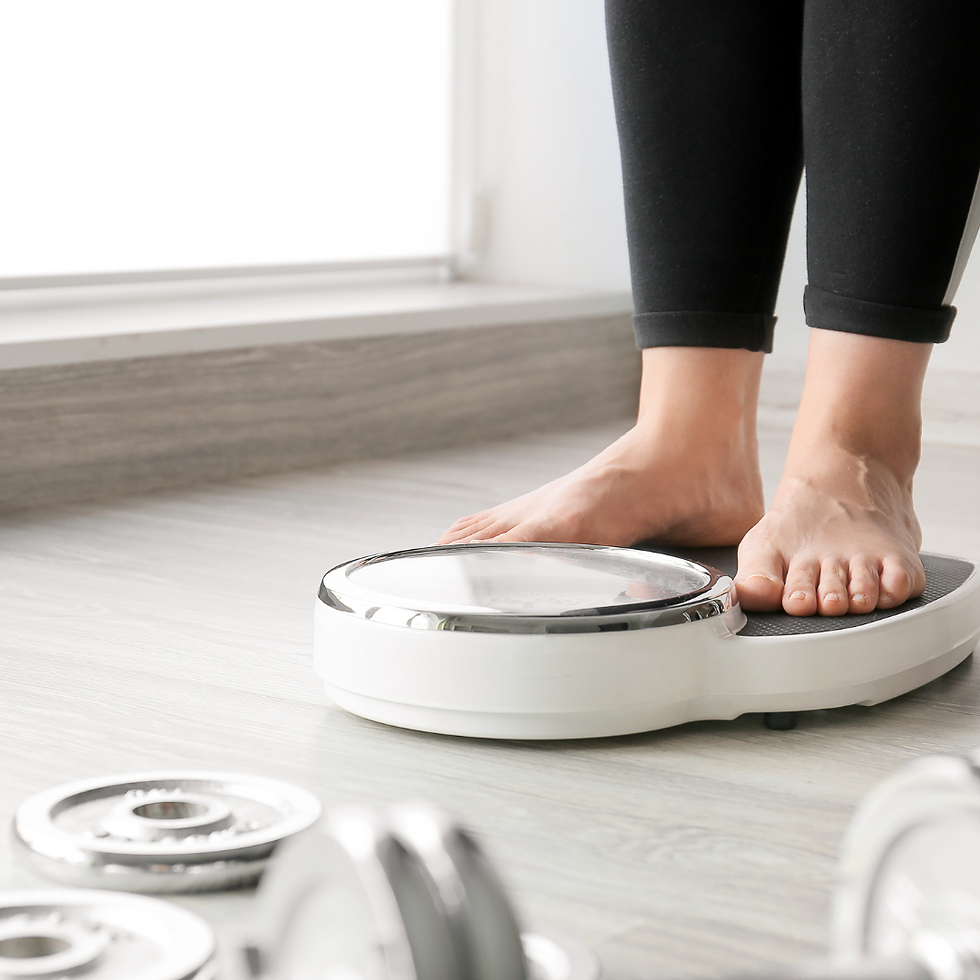Hormones and Weight Gain: Everything You Need to Know
- Laura Martire

- Jun 9, 2022
- 4 min read
Updated: Sep 2, 2025
Hormones and weight gain are like peanut butter and jelly, right? Well, not exactly but our hormones do play a large role in our weight management.
We're often led to believe that losing weight is solely about calories in versus calories out. That doesn't always tell the full story, especially if your hormones aren't balanced. Your hormones can play a huge role in helping or hindering your weight loss efforts. They can affect everything from your appetite to where you’re most likely to store fat.

When it comes to weight loss and weight maintenance, calories and hormone balance both matter, but if I had to prioritize one over the other, I’d choose hormones every time.
Your hormones have a direct impact on your metabolism. Intense exercise will impact your cortisol. Cortisol impacts insulin. Insulin resistance causes cravings and low energy.
Soon, estrogen and progesterone are out of whack, causing symptoms like bloating, headaches, and mood swings. It’s all connected and your hormones can cause weight gain and affect your ability to lose weight or maintain a weight you feel good at.
But here’s the good news: it’s easier than you might think to control these hormones and keep your weight in check.
Here Is How Hormones Affect Your Weight:
Stress Hormones
Being super stressed and busy can mean that stress hormones such as cortisol are constantly being released. High cortisol levels are linked to overeating and weight gain, especially around the belly.
Often, you'll be craving high carb and sugar-rich foods, especially if other hormones are also out of whack.
Here are a few daily habits that can help avoid super high cortisol levels:
Eat the rainbow. Include a variety of fruits and vegetables
Stay hydrated (aim for 2L per day)
Daily movement (walking, strength training, yoga)
Prioritize sleep
Manage stress. Incorporate daily stress management practices
Estrogen and Progesterone
Estrogen levels can be affected by factors such as body fat, intense exercise, and Polycystic Ovary Syndrome (PCOS). If your estrogen levels are high, it can make it a whole heap harder to lose weight. It can sometimes be a factor in insulin resistance too.
Low levels of estrogen can also affect weight, especially around menopause.
Progesterone is another sex hormone that has an impact on weight. It can be easily depleted by factors such as stress, birth control pills, and menopause.
Ideally, you want to have a healthy ratio of estrogen and progesterone — if one is higher or lower than it should be, it can quickly affect the other. Estrogen dominance and low progesterone can have similar symptoms and it’s super common for them to go hand-in-hand. That’s why I love the DUTCH Complete hormone test because it tells us exactly which hormones are out of balance and contributing to your symptoms so we can get to the root cause and make the necessary changes to get you back on track.
If your sex hormones are out of whack, you’ll probably also notice a ton of other unpleasant health problems, including headaches, mood swings, fatigue, insomnia, anxiety, and menstrual problems.
Insulin
Every time you eat or drink something that’s sugary or rich in carbs, your blood sugar spikes.
This triggers insulin production – insulin is a hormone that prompts the cells to either store this sugar or use it for energy. Your cells absorb this sugar, and the level of sugar in the bloodstream starts to decrease.
If you are consuming a diet too rich in processed carbs and sugar it can become difficult for your body to keep up and the constant fluctuations in your blood sugar can lead to insulin resistance. Insulin resistance causes insulin and blood sugar levels to remain high long after eating.
This can ultimately lead to hormone imbalances, diabetes, energy spikes and crashes, cravings, and weight gain.
Refined carbs such as white pasta and white bread are super common culprits for blood sugar spikes. Swapping these for whole grains slows down the absorption into the bloodstream so your blood sugar is more likely to stay stable for longer, along with your body’s insulin response. And as an added bonus, the extra fibre from non-refined carbs will keep you feeling fuller, and snacking is less of a problem.
The end result? It's easier to keep weight in check when your blood sugar and insulin levels aren't erratic.
Leptin and Ghrelin
Leptin and ghrelin are two more hormones that are heavily linked to appetite. When your leptin levels are balanced, you feel full after meals. If you're still feeling super hungry even after eating a big meal, leptin may be at least partly to blame. Leptin levels can be balanced out through diet and exercise.
For some people, it may need a bit more than this, especially if you've been eating a ton of unhealthy foods for years and are experiencing leptin resistance.
Ghrelin is also a super important hormone for keeping appetite in check. Ghrelin stimulates appetite. Under normal circumstances, ghrelin levels fall after eating and rise again when you're hungry.
This balance avoids overeating but it can quickly be tipped the wrong way, especially if you're under a lot of stress. Not eating enough protein and going overboard on sugary foods and drinks can also affect ghrelin levels.
Thyroid Hormones
Your thyroid can play a key role in your metabolism. If you have a sluggish thyroid, it can be a culprit for weight gain and fluid retention. It can also contribute to lots of other issues, including tiredness, dry skin, sensitivity to the cold, and depression. You can learn more about thyroid imbalances here.
Blood tests can pick up thyroid imbalances so it’s super important to get this ruled out if you’re struggling to lose weight despite a healthy lifestyle.
So as you can see hormones can cause weight gain. Keeping your hormones happy and balanced is important if you are trying to lose weight or maintain a weight you feel good at with ease. Simply eating less and exercising more will never get you the results you want because you're relying on your willpower and missing a big piece of the puzzle - your hormones.
Now, beyond your hormones, here are a few things to consider if you are dealing with stubborn weight gain:
Lack of consistently good quality sleep can impact hormones and weight gain
Inflammation and food sensitivities can impact leptin levels (remember that's the hormone that tells you when you are full)
The type of food you consume matters - nutrient-dense whole foods will help support healthy hormones so you can hit your happy weight.









Comments